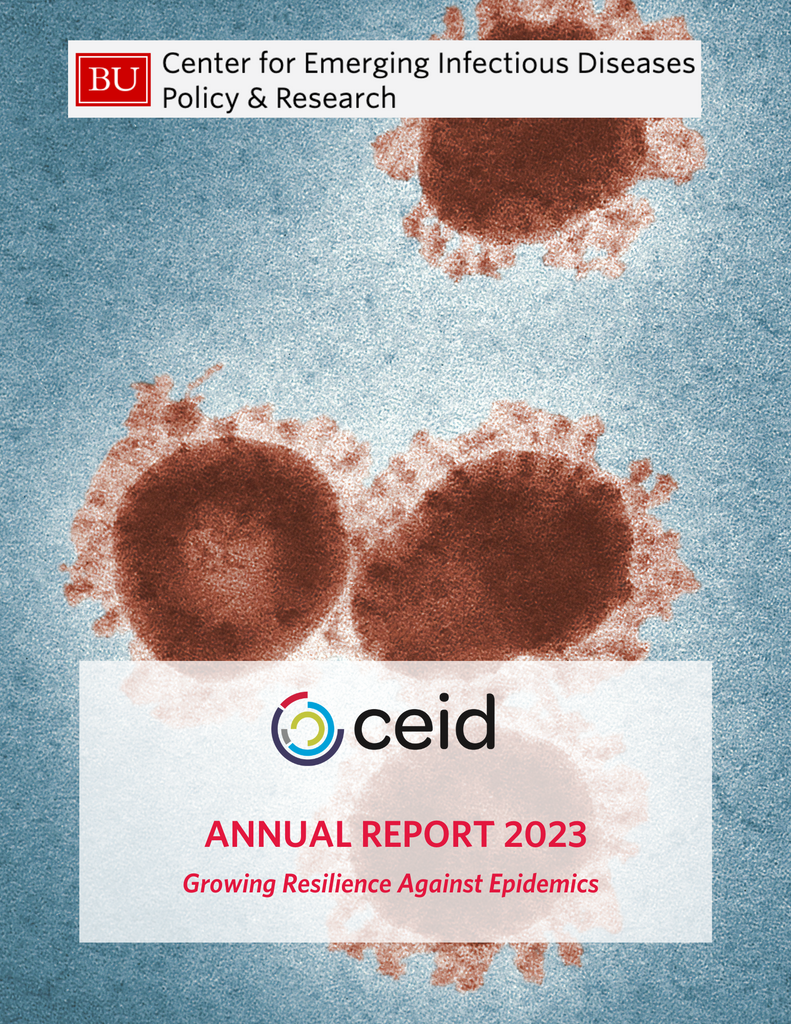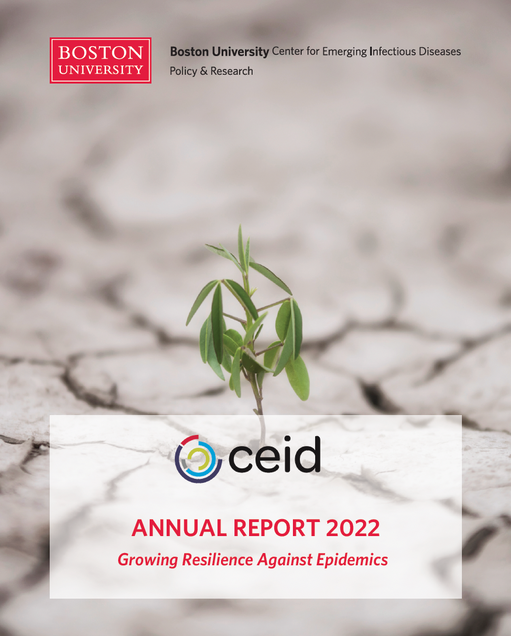Center News
CEID launches four Core Research Initiatives
This year, as Boston University’s Center for Emerging Infectious Diseases Policy & Research (CEID) continues to pursue our mission to build resilience against new pandemic threats, we have focused our efforts on four Core Research Initiatives. These cores highlight high priority areas within emerging infectious that require closer linkage between... More

Annual Report 2023
Boston University's Center for Emerging Infectious Diseases Policy and Research is proud to release our Annual Report reflecting on the 2022-2023 academic year.
Boston University Researchers Receive CDC Grant for Epidemic Analytics & Predictive Modeling Project
FOR IMMEDIATE RELEASE Tuesday, September 19, 2023Contact:Cassandra Kocek (BU CEID), ckocek@bu.eduJillian McKoy (BU SPH), jpmckoy@bu.edu ## Boston University Researchers Receive CDC Grant for Epidemic Analytics & Predictive Modeling ProjectThe COVID-19 pandemic has underscored the critical need for enhanced epidemic modeling and analytic tools. Despite advances in epidemic modeling and analytics, issues persist around... More

Reflecting On One Year of MPOX Response event highlights
On August 17, 2023, CEID hosted a hybrid event, “Reflecting on One Year of MPOX Response,” in partnership with BU’s Hariri Institute for Computational Sciences & Engineering. The panel discussion, which was moderated by CEID Director, Dr. Nahid Bhadelia, featured opening remarks from Dr. Ashish Jha, Dean of Brown University’s... More

CEID Releases 2022 Annual Report
Boston University's Center for Emerging Infectious Diseases Policy and Research is proud to release our Annual Report: Growing Resilience Against Epidemics. The report opens with a letter by CEID Founding Director, Dr. Nahid Bhadelia, who is currently on sabbatical. "We founded CEID a year ago with a vision that to address... More

BU’s Nahid Bhadelia Joins White House COVID Response Team

CEID Faculty Dr. David Hamer To Serve As Interim Director
Dear CEID Community, We write to congratulate our Founding Director, Dr. Nahid Bhadelia, who has joined the White House COVID-19 Response Team as senior policy advisor for global COVID-19 response. We also want to share that Dr. Bhadelia will be on sabbatical for the duration of this full-time position. During this interim... More

Working with healthcare workers to improve vaccination uptake in Uganda
Over the last two years, more than ten billion doses of COVID-19 vaccines have been administered worldwide. However, global vaccine inequity has led to disproportionate vaccine distribution, with Africa, for example, receiving less than 6% of the worldwide share of vaccines. We believe that advocacy to bridge this disparity is... More
Boston University’s Center for Emerging Infectious Diseases Policy & Research (CEID) Announces $25K Pilot Grant Awardees
An integral component of CEID’s mission is to share knowledge and training opportunities that improve societal resilience against emerging and epidemic infectious diseases threats worldwide. As part of that goal, in Fall 2021, we released an inaugural call for proposals for pilot grants in the amount of $25,000. After a peer... More
New Partnership with CONNECTED DMV to build global resilience against emerging infectious disease threats
We are excited to announce a partnership between CEID and CONNECTED DMV. We will be cooperating with CONNECTED DMV in their Pandemic Prevention and Biodefense Initiative and serve as a key partner in the Global Pandemic Prevention and Biodefense Center and AHEAD100 initiative. CONNECTED DMV’s Global Pandemic Prevention & Biodefense Center aims... More